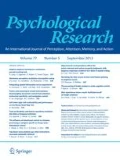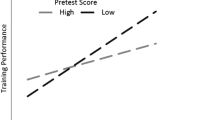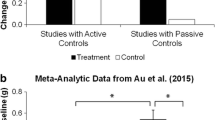Abstract
Previous research has shown mixed results for the ability of working memory training to improve fluid intelligence. The aims of this study were first to replicate these improvements, and then to explore the moderating role of Personality Systems Interaction (PSI) personality factors. By using three different training methods and an active-contact control group, we examined the effects of 25 days of cognitive training on 142 participants. After examining our results in context of PSI theory, we found that different training methods yielded different IQ gains in participants, depending on their personality styles. In addition, these correlations suggested a meaningful pattern, indicating that PSI theory may be able to account for the different outcomes of cognitive training studies. Our findings may facilitate tailor-made cognitive training interventions in the future, and can contribute to explaining the mechanisms underlying the far transfer of working memory training to fluid intelligence.



Similar content being viewed by others
References
Ashton, M. C., & Lee, K. (2009). The HEXACO-60: A short measure of the major dimensions of personality. Journal of Personality Assessment, 91(4), 340–345.
Au, J., Sheehan, E., Tsai, N., Duncan, G. J., Buschkuehl, M., & Jaeggi, S. M. (2014). Improving fluid intelligence with training on working memory: A meta-analysis. Psychonomic Bulletin & Review,. doi:10.3758/s13423-014-0699-x.
Baniqued, P. L., Kranz, M. B., Voss, M. W., Lee, H., Cosman, J. D., Severson, J., et al. (2013). Cognitive training with casual video games: Points to consider. Frontiers in Psychology,. doi:10.3389/fpsyg.2013.01010.
Bauernschmidt, A., Conway, C. M., & Pisoni, D. B. (2009). Working memory training and implicit learning. Report: Research on Spoken Language Processing Progress. 29.
Brehmer, Y., Westerberg, H., & Bäckman, L. (2012). Working-memory training in younger and older adults: Training gains, transfer, and maintenance. Frontiers in Human Neuroscience,. doi:10.3389/fnhum.2012.00063.
Burgess, G. C., Gray, J. R., Conway, A. R. A., & Braver, T. S. (2011). Neural mechanisms of interference control underlie the relationship between fluid intelligence and working memory span. Journal of Experimental Psychology: General, 140(4), 674–692.
Carretti, B., Borella, E., Zavagnin, M., & de Beni, R. (2012). Gains in language comprehension relating to working memory training in healthy older adults. International Journal of Geriatric Psychiatry, 28(5), 539–546.
Carroll, J. B. (1993). Human cognitive abilities: A survey of factor-analytic studies. New York: Cambridge University Press.
Chein, J. M., & Morrison, A. B. (2010). Expanding the mind’s workspace: Training and transfer effects with a complex working memory span task. Psychonomic Bulletin Review, 17(2), 193–199.
Chooi, W.-T., & Thompson, L. A. (2012). Working memory training does not improve intelligence in healthy young adults. Intelligence, 40(6), 531–542.
Colom, R., Abad, F. J., Quiroga, M. Á., Shih, P. C., & Flores-Mendoza, C. (2008). Working memory and intelligence are highly related constructs, but why? Intelligence, 36(6), 584–606.
Colom, R., Quiroga, M. Á., Shih, P. C., Martinez, K., Burgaleta, M., Martinez-Molina, A., et al. (2010). Improvement in working memory is not related to increased intelligence scores. Intelligence, 38(5), 497–505.
Colom, R., Román, F. J., Abad, F. J., Shih, P. C., Privado, J., Froufe, M., et al. (2013). Adaptive n-back training does not improve fluid intelligence at the construct level: gains on individual tests suggest that training may enhance visuospatial processing. Intelligence, 41(5), 712–727.
Colquitt, J. A., LePine, J. A., & Noe, R. (2000). Toward an integrative theory of training motivation: A meta-analytic path of analysis of 20 years of research. Journal of Applied Psychology, 85(5), 678–707.
Demetriou, A., Kyriakides, L., & Avraamidou, C. (2003). The missing link in the relations between intelligence and personality. Journal of Research in Personality, 37(6), 547–581.
Eysenck, H. J. (1950). Dimensions of personality (Vol. 5). New Brunswick: Transaction Publishers.
Farsides, T., & Woodfield, R. (2003). Individual differences and undergraduate academic success: The roles of personality, intelligence, and application. Personality and Individual Differences, 34(7), 1225–1243.
Freedman, D. A. (2010). Statistical models and causal inference: A dialogue with the social sciences. New York: Cambridge University Press.
Gates, N., & Valenzuela, M. (2010). Cognitive exercise and its role in cognitive function in older adults. Current Psychiatry Reports, 12(1), 20–27.
Granger, C. W. (1969). Investigating causal relations by econometric models and cross-spectral methods. Econometrica: Journal of the Econometric Society, 37(3), 424–438.
Gray, J. R., Chabris, C. F., & Braver, T. S. (2003). Neural mechanisms of general fluid intelligence. Nature Neuroscience, 6, 316–322.
Green, C. S., Strobach, T., & Schubert, T. (2014). On methodological standards in training and transfer experiments. Psychological Research, 78(6), 756–772.
Hossiep, R., Turck, D., & Hasella, M. (1999). Bochumer Matrizentest (BOMAT) advanced. Göttingen: Hogrefe.
Jaeggi, S. M., Buschkuehl, M., Jonides, J., & Perrig, W. J. (2008). Improving fluid intelligence with training on working memory. Proceedings of the National Academy of Sciences, 105(19), 6829.
Jaeggi, S. M., Buschkuehl, M., Jonides, J., & Shah, P. (2011). Short- and long-term benefits of cognitive training. Proceedings of the National Academy of Sciences, 108(25), 10081–10086.
Jaeggi, S. M., Buschkuehl, M., Shah, P., & Jonides, J. (2014). The role of individual differences in cognitive training and transfer. Memory & Cognition, 42(3), 464–480.
Jaeggi, S. M., Studer-Luethi, B., Buschkuehl, M., Su, Y.-F., Jonides, J., & Perrig, W. J. (2010). The relationship between n-back performance and matrix reasoning — implications for training and transfer. Intelligence, 38(6), 625–635.
Jausovec, N., & Jausovec, K. (2012a). Sex differences in mental rotation and cortical activation patterns: Can training change them? Intelligence, 40(2), 151–162.
Jausovec, N., & Jausovec, K. (2012b). Working memory training: improving intelligence-changing brain activity. Brain and Cognition, 79(2), 96–106.
Johnson, W., & Bouchard, T. J. (2005a). Constructive replication of the visual-perceptual-image rotation model in Thurstone’s (1941) battery of 60 tests of mental ability. Intelligence, 33(4), 417–430.
Johnson, W., & Bouchard, T. J. (2005b). The structure of human intelligence: It is verbal, perceptual, and image rotation (VPR), not fluid and crystallized. Intelligence, 33(4), 393–416.
Kane, M. J., Hambrick, D. Z., & Conway, A. R. A. (2005). Working memory capacity and fluid intelligence are strongly related constructs: Comment on Ackerman, Beier, and Boyle (2005). Psychological Bulletin, 131(1), 66–71.
Karbach, J., & Kray, J. (2009). How useful is executive control training? Age differences in near and far transfer of task-switching training. Developmental Science, 12(6), 978–990.
Karbach, J., & Verhaeghen, P. (2014). Making working memory work: A meta-analysis of executive-control and working memory training in older adults. Psychological Science, 25(11), 2027–2037.
Kaufman, S. B., DeYoung, C. G., Gray, J. R., Brown, J., & Mackintosh, N. (2009). Associative learning predicts intelligence above and beyond working memory and processing speed. Intelligence, 37(4), 374–382.
Kazén, M., Kuhl, J., Boermans, S., & Koole, S. L. (2013). Excelling at selling: The charming personality style predicts occupational activities, sales performance, and persuasive competence. PsyCh Journal, 2(2), 86–100.
Könen, T., & Karbach, J. (2015). The benefits of looking at intraindividual dynamics in cognitive training data. Frontiers in Psychology,. doi:10.3389/fpsyg.2015.00615.
Kueider, A. M., Parisi, J. M., Gross, A. L., & Rebok, G. W. (2012). Computerized cognitive training with older adults: a systematic review. PLoS One, 7(7), e40588.
Kuhl, J. (2000a). A theory of self-development: affective fixation and the STAR model of personality disorders and related styles. In J. Heckhausen (Ed.), Motivational psychology of human development: developing motivation and motivating development. Oxford: Elsevier.
Kuhl, J. (2000b). The volitional basis of personality systems interaction theory: Applications in learning and treatment contexts. International Journal of Educational Research, 33(7), 665–703.
Kuhl, J. (2000c). A functional-design approach to motivation and volition: The dynamics of personality systems interactions. In M. Boekaerts, P. R. Pintrich, M. Zeidner (Eds.), Handbook of self-regulation (pp. 111–169). New York: Academic Press.
Kuhl, J., & Kazén, M. (1997). Persönlichkeits-Stil-und-Störungs-Inventar (PSSI) [The Personality-Styles-and-Disorder-Inventory (PSDI): Manual]. Göttingen: Hogrefe.
Kuhl, J., Kazén, M., & Koole, S. L. (2006). Putting self-regulation theory into practice: A user’s manual. Applied Psychology, 55(3), 408–418.
Kuhl, J., & Koole, S. L. (2004). Workings of the will: A functional approach. In J. Greenberg, S. L., Koole, & T. Pyszczynski (Eds.), Handbook of experimental existential psychology (pp. 411–430). New York: Guilford.
Mackintosh, N. (2011). IQ and human intelligence. New York: Oxford University Press.
Makel, M. C., Plucker, J. A., & Hegarty, B. (2012). Replications in psychology research: how often do they really occur? Perspectives on Psychological Science, 7(6), 537–542.
Melby-Lervåg, M., & Hulme, C. (2013). Is working memory training effective? A meta-analytic review. Developmental Psychology, 49(2), 270.
Moody, D. E. (2009). Can intelligence be increased by training on a task of working memory? Intelligence, 37(4), 327–328.
Morrison, A. B., & Chein, J. M. (2011). Does working memory training work? The promise and challenges of enhancing cognition by training working memory. Psychonomic Bulletin & Review, 18(1), 46–60.
Oberauer, K., Süs, H. M., Wilhelm, O., & Wittmann, W. W. (2008). Which working memory functions predict intelligence? Intelligence, 36(6), 641–652.
Oelhafen, S., Nikolaidis, A., Padovani, T., Blaser, D., Koenig, T., & Perrig, W. J. (2013). Increased parietal activity after training of interference control. Neuropsychologia, 51(13), 2781–2790.
Owen, A. M., Hampshire, A., Grahn, J. A., Stenton, R., Dajani, S., Burns, A. S., et al. (2010). Putting brain training to the test. Nature, 465(7299), 775–778.
Penner, I.-K., Vogt, A., Stöcklin, M., Gschwind, L., Opwis, K., & Calabrese, P. (2012). Computerised working memory training in healthy adults: a comparison of two different training schedules. Neuropsychological Rehabilitation, 22(5), 716–733.
Peters, M., Laeng, B., Latham, K., Jackson, M., Zaiyouna, R., & Richardson, C. (1995). A redrawn Vandenberg and Kuse mental rotations test-different versions and factors that affect performance. Brain and Cognition, 28(1), 39–58.
Pugin, F., Metz, A. J., Stauffer, M., Wolf, M., Jenni, O. G., & Huber, R. (2014). Working memory training shows immediate and long-term effects on cognitive performance in children and adolescents. F1000Research, 3, 82.
Rabipour, S., & Raz, A. (2012). Training the brain: Fact and fad in cognitive and behavioral remediation. Brain and Cognition, 79(2), 159–179.
Rafi, A., & Samsudin, K. (2009). Practising mental rotation using interactive desktop mental rotation trainer (iDeMRT). British Journal of Educational Technology, 40(5), 889–900.
Raven, J. C. (1990). Advanced Progressive Matrices. Sets I, II. Oxford: Oxford University Press.
Redick, T. S. (2015). Working memory training and interpreting interactions in intelligence interventions. Intelligence, 50, 14–20.
Redick, T. S., Shipstead, Z., Harrison, T. L., Hicks, K. L., Fried, D. E., Hambrick, D. Z., et al. (2012). No evidence of intelligence improvement after working memory training: A randomized, placebo-controlled study. Journal of Experimental Psychology: General, 142(2), 359–379.
Reijnders, J., van Heugten, C., & van Boxtel, M. (2012). Cognitive interventions in healthy older adults and people with mild cognitive impairment: A systematic review. Ageing Research Reviews, 12(1), 263–275.
Salminen, T., Strobach, T., & Schubert, T. (2012). On the impacts of working memory training on executive functioning. Frontiers in Human Neuroscience, 6, 166.
Savage, L. (2013). Near and far transfer of working memory training related gains in healthy adults (Unpublished doctoral dissertation), Department of Clinical Psychology. Alberta: University of Calgary.
Schmiedek, F., Lövdén, M., & Lindenberger, U. (2010). Hundred days of cognitive training enhance broad cognitive abilities in adulthood: Findings from the COGITO study. Frontiers in Aging Neuroscience, 2, 27.
Schubert, T., & Strobach, T. (2012). Video game experience and optimized executive control skills—On false positives and false negatives: Reply to Boot and Simons (2012). Acta Psychologica, 141(2), 278–280.
Schwaighofer, M., Fischer, F., & Bühner, M. (2015). Does Working Memory Training Transfer? A Meta-Analysis Including Training Conditions as Moderators. Educational Psychologist, 50(2), 138–166.
Shipstead, Z., Redick, T. S., & Engle, R. W. (2012). Is working memory training effective? Psychological Bulletin, 138(4), 628–654. doi:10.1037/a0027473.
Soubelet, A., & Salthouse, T. A. (2011). Personality–cognition relations across adulthood. Developmental Psychology, 47(2), 303.
Spielberger, C. D., & Gorsuch, R. L. (1983). State-trait anxiety inventory for adults: Sampler set: manual, test, scoring key. Menlo Park: Mind Garden.
Stephenson, C. (2010). Does training to increase working memory capacity improve fluid intelligence? (Doctoral dissertation). UMI Dissertation Publishing (number: 3417011). Claremont Graduate University, Ann Arbor, Michigan.
Stephenson, C. L., & Halpern, D. F. (2013). Improved matrix reasoning is limited to training on tasks with a visuospatial component. Intelligence, 41(5), 341–357.
Sternberg, R. J. (2008). Increasing fluid intelligence is possible after all. Proceedings of the National Academy of Sciences, 105(19), 6791–6792.
Stransky, D., Wilcox, L. M., & Dubrowski, A. (2010). Mental rotation: cross-task training and generalization. Journal of Experimental Psychology: Applied, 16(4), 349.
Studer-Luethi, B., Jaeggi, S. M., Buschkuehl, M., & Perrig, W. J. (2012). Influence of neuroticism and conscientiousness on working memory training outcome. Personality and Individual Differences, 53(1), 44–49.
Subramaniam, K., Luks, T. L., Fisher, M., Simpson, G. V., Nagarajan, S., & Vinogradov, S. (2012). Computerized cognitive training restores neural activity within the reality monitoring network in schizophrenia. Neuron, 73(4), 842–853.
Thompson, T. W., Waskom, M. L., Garel, K.-L. A., Cardenas-Iniguez, C., Reynolds, G. O., Winter, R., et al. (2013). Failure of working memory training to enhance cognition or intelligence. PLoS One, 8(5), e63614.
Wang, Z., Zhou, R., & Shah, P. (2014). Spaced cognitive training promotes training transfer. Frontiers in Human Neuroscience, 8, 217.
Wechsler, D. (2008). Wechsler adult intelligence scale–Fourth Edition (WAIS–IV). San Antonio: NCS Pearson.
Wykes, T., Reeder, C., Landau, S., Everitt, B., Knapp, M., Patel, A., & Romeo, R. (2007). Cognitive remediation therapy in schizophrenia: Randomised controlled trial. The British Journal of Psychiatry, 190(5), 421–427.
Acknowledgments
Our study took place with the financial support of the Czech Science Foundation, project no. GAČR13-36836S, awarded to Tomáš Urbánek. This funding source had no involvement in study design; in the collection, analysis, and interpretation of data; in the writing of the report; or in the decision to submit the article for publication.
Author information
Authors and Affiliations
Corresponding author
Additional information
This research was supported by the Czech Science Foundation (GACR) project no. 13-36836S.
Rights and permissions
About this article
Cite this article
Urbánek, T., Marček, V. Investigating the effectiveness of working memory training in the context of Personality Systems Interaction theory. Psychological Research 80, 877–888 (2016). https://doi.org/10.1007/s00426-015-0687-4
Received:
Accepted:
Published:
Issue Date:
DOI: https://doi.org/10.1007/s00426-015-0687-4




